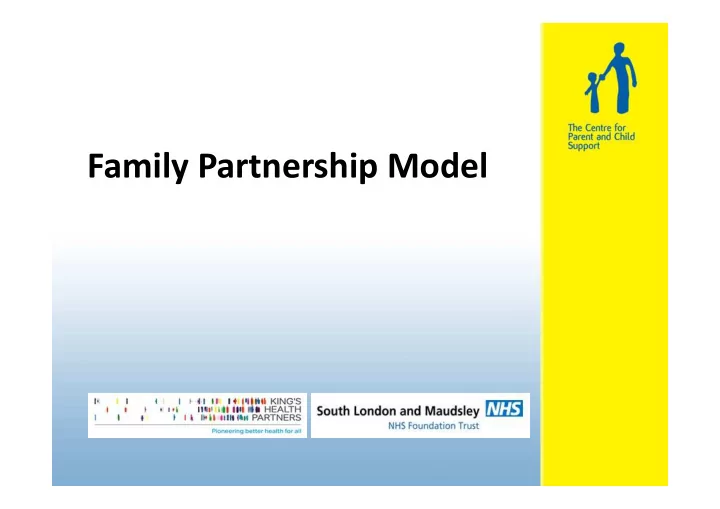

Family Partnership Model
Family Partnership Model Partnership Helper Skills Helper Qualities Helping Outcomes Process Characteristics of Parents and Children Service & Community Context Construction Processes
Intended outcomes of helping • Do no harm • Help parents and children to identify and build on strengths • Help to clarify and manage problems • Foster resilience & problem anticipation • Foster resilience & problem anticipation • Foster development and well-being of children • Facilitate social support and community development • Enable service support • Compensate where necessary • Improve the service system
Essential qualities of the helper • Respect • Genuineness • Empathy • Humility • Humility • Quiet enthusiasm • Personal strength and integrity • Intellectual and emotional attunement
Skills of helpers • Concentration/Active listening • Prompting, exploration and summarising • Empathic responding • Enthusing and encouraging • Enthusing and encouraging • Enabling change in feelings, ideas and actions • Negotiating • Communicating and making use of technical knowledge, expertise and experience • Problem management
Partnership • Working together with active participation/involvement • Developing and maintaining genuine connectedness • Sharing decision making power • Recognising complementary expertise and roles. • Recognising complementary expertise and roles. • Sharing and agreeing aims and process of helping • Negotiation of disagreement • Showing mutual trust and respect • Developing and maintaining openness and honesty • Communicating clearly
Characteristics of parents and children • Nature of parent and child problems • Barriers to engagement • Motivation to change • Attitudes and beliefs about services • Attitudes and beliefs about services • Expectations of outcome • Socioeconomic circumstances • Culture
The Helping Process Relationship Building Exploration Understanding Goal Setting Strategy Planning Implementation Review Ending
Service characteristics • Reflective practice, supervision and support • Skills, knowledge and competence of staff • Drive and enthusiasm of practitioners, managers etc. • Attitudes and beliefs about service • Attitudes and beliefs about service provision • Expectations of change and outcome • Organisational culture, structure, stability, openness and flexibility, value of and access to meet users needs • Resources available and their use
Constructivism Everyone takes in and processes information for • meaning Everyone constructs a model of the world • This helps people to anticipate and adapt to the world • Constructions develop from previous experience • Unique to the individual • Not necessarily conscious or verbal • Constant process of testing, clarification and change • Social perceptions, interaction and feelings • determined by constructions of others
Recommend
More recommend